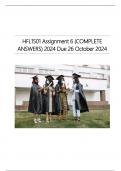HFL1501 Assignment 6 (COMPLETE
ANSWERS) 2024 Due 26 October 2024
.
,QUESTION 1 1.1 Name one South African constitution of which you have learned in this
module that embraced an approach of complete denial of the principle of
constitutionalism. (1) 1.2 Provide evidence from the Constitution of the Republic of
South Africa, 1996 that supports the statement that the current South African
governmental structure is not based on parliamentary supremacy. (4)
QUESTION 1
1.1
Name one South African constitution of which you have learned in this module
that embraced an approach of complete denial of the principle of
constitutionalism.
In Learning Unit 1 of the study guide, the South African Constitution that embraced an
approach of complete denial of the principle of constitutionalism was the Apartheid-era
Constitution, which vested supreme power in the Parliament rather than recognizing the
supremacy of the Constitution itself. This political system was based on the supremacy of
Parliament, denying constitutionalism by allowing laws that could override fundamental
human rights without constitutional checks and balances. The system of parliamentary
sovereignty under Apartheid rejected the notion of limiting government power through
a higher legal authority like a constitution.
1.2
Provide evidence from the Constitution of the Republic of South Africa, 1996 that
supports the statement that the current South African governmental structure is not
based on parliamentary supremacy.
, Evidence from the Constitution of the Republic of South Africa, 1996 that supports the
statement that the current governmental structure is not based on parliamentary
supremacy can be found in Section 2, which states:
"This Constitution is the supreme law of the Republic; law or conduct inconsistent with it
is invalid, and the obligations imposed by it must be fulfilled."
This section clearly establishes the supremacy of the Constitution over Parliament and all
other branches of government. Unlike in the past, where Parliament had ultimate
authority, the 1996 Constitution ensures that all laws, policies, and actions of the
government, including those made by Parliament, must conform to the principles and
provisions outlined in the Constitution. If any law or action conflicts with the
Constitution, it can be declared invalid by the courts, reinforcing the idea that South
Africa’s governmental structure is now based on constitutional supremacy, not
parliamentary supremacy.




